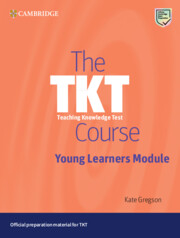Book contents
- Frontmatter
- Acknowledgements
- Contents
- Introduction
- Part 1 Knowledge of young learners and principles of teaching English to young learners
- Part 2 Planning and preparing young learner lessons
- Part 3 Teaching young learners
- Part 4 Assessing young learner learning in the classroom
- Follow-up activities: Answer keys and commentaries
- List of terms found in the TKT Glossary
- Glossary of TKT: Young Learners terms
- Test tips for TKT: Young Learners
- Teaching knowledge test young learners: Practice test
- Sample test answer sheet for TKT: YL practice test
- Answer key for TKT: YL practice test
Unit 13 - Responding to assessment: How can I act on the results of classroom-based assessment?
Published online by Cambridge University Press: 14 March 2024
- Frontmatter
- Acknowledgements
- Contents
- Introduction
- Part 1 Knowledge of young learners and principles of teaching English to young learners
- Part 2 Planning and preparing young learner lessons
- Part 3 Teaching young learners
- Part 4 Assessing young learner learning in the classroom
- Follow-up activities: Answer keys and commentaries
- List of terms found in the TKT Glossary
- Glossary of TKT: Young Learners terms
- Test tips for TKT: Young Learners
- Teaching knowledge test young learners: Practice test
- Sample test answer sheet for TKT: YL practice test
- Answer key for TKT: YL practice test
Summary
LEARNING OUTCOMES
By the end of this unit, you will…
KNOWLEDGE: have found out about ways teachers and learners may respond to classroom-based assessment findings
SKILLS: be able to better implement appropriate adjustments and give formative feedback based on the results of assessment
■ Starter Question
Before you begin this unit, read the starter question and make some notes. Then read the commentary and compare it to your notes.
What do/might you do after assessment? Think about how assessment impacts on teaching and learning in your classroom. Note three or four points.
COMMENTARY
In Unit 11, we saw how assessment for learning drives teaching and learning forwards as a result of the information it can give teachers and learners. This information is sometimes known as ‘assessment evidence’, and it can be used to make changes to teaching and learning and to set new learning goals. It might be evidenced in the teacher's notes from observing learners as they work on different activities, learners’ worksheets, coursebook exercises, or written work, and so on.
There are a number of different areas we might consider changing in our classroom, based on what we find in that assessment evidence. For example, we may decide to review learning:
Example: The teacher sees that learners have not achieved the learning they wanted them to (as per the learning objectives), decide that learners need more practice in that particular language area or skill, and then plan to review that area in an upcoming lesson.
Example: The teacher notices from our monitoring and observation that several learners have difficulty with the pronunciation of one or two words in the unit vocabulary, so decides to review or even re-teach the pronunciation by giving extra models and playing a speaking game which focuses on discriminating sounds.
The teacher may decide to change the pace or to skip course content:
Example: The closing stage of the lesson shows the teacher that learners have excelled and have achieved learning outcomes earlier than expected. The teacher decides to skip some upcoming activities or sections in the course plan or coursebook which give more practice in that area.
- Type
- Chapter
- Information
- The TKT Course Young Learners Module , pp. 136 - 146Publisher: Cambridge University PressPrint publication year: 2024



